ROAD TO 2024 ELECTIONS
The forgotten people: We visited the North West town where almost nobody votes
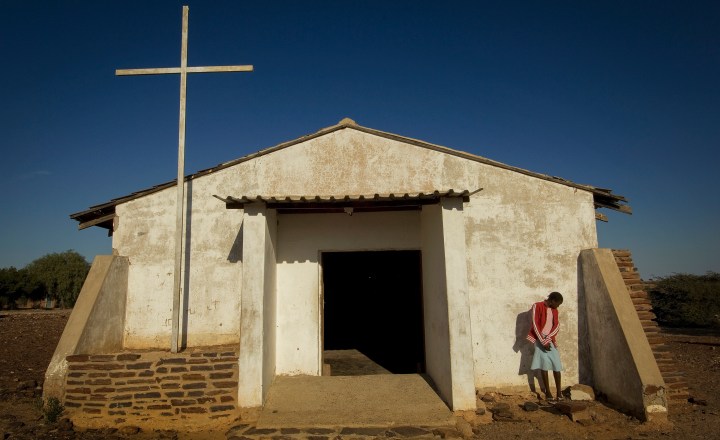
The municipality of Kagisano-Molopo in North West had the lowest voter turnout in South Africa in the 2019 elections. We visited the town of Pomfret to try to find out why.
In a desert town close to the Botswana border, in a neatly landscaped cactus garden, 75-year-old Vieira Monte has tied a Democratic Alliance (DA) poster to a tree.
“White men brought me here,” says Monte, who is black. “I want to vote for white people.”
Welcome to Pomfret, North West. It is one of the strangest towns in the country, with a history as complex as South Africa itself.
Read more in Daily Maverick: Elections 2024 – All your questions answered

A Democratic Alliance (DA) poster hangs in Vieira Monte’s garden in Pomfret on 11 April 2024. The only election posters scattered around the town belong to the DA. (Photo: Victoria O’Regan)
This is a place where the likes of Monte, who is eager to cast his vote on 29 May, are an anomaly. As part of the Kagisano-Molopo Local Municipality, the town recorded the lowest voter turnout in the country in the 2019 elections.
When you visit Pomfret, it doesn’t take long to realise why this would be the case. But hardly anyone visits Pomfret, ever. Almost two hours’ drive from the nearest big town, Vryburg, and buttressed by a deadly old asbestos mine, it is inaccessible and unenticing as a destination. In this sun-bleached crumbling army barracks, residents will tell you the same thing over and over: they have been forgotten by anyone who matters.
***
The story of Pomfret, in one telling, is like a cautionary tale from Greek mythology.
Once upon a time there was a group of soldiers who were regarded as some of the best fighters in the world. But they chose to fight against their own people, and when the war was over they were banished to a limbo territory from which they could never move, doomed never to see their original homes again — but equally never to be accepted by the land in which they found themselves.
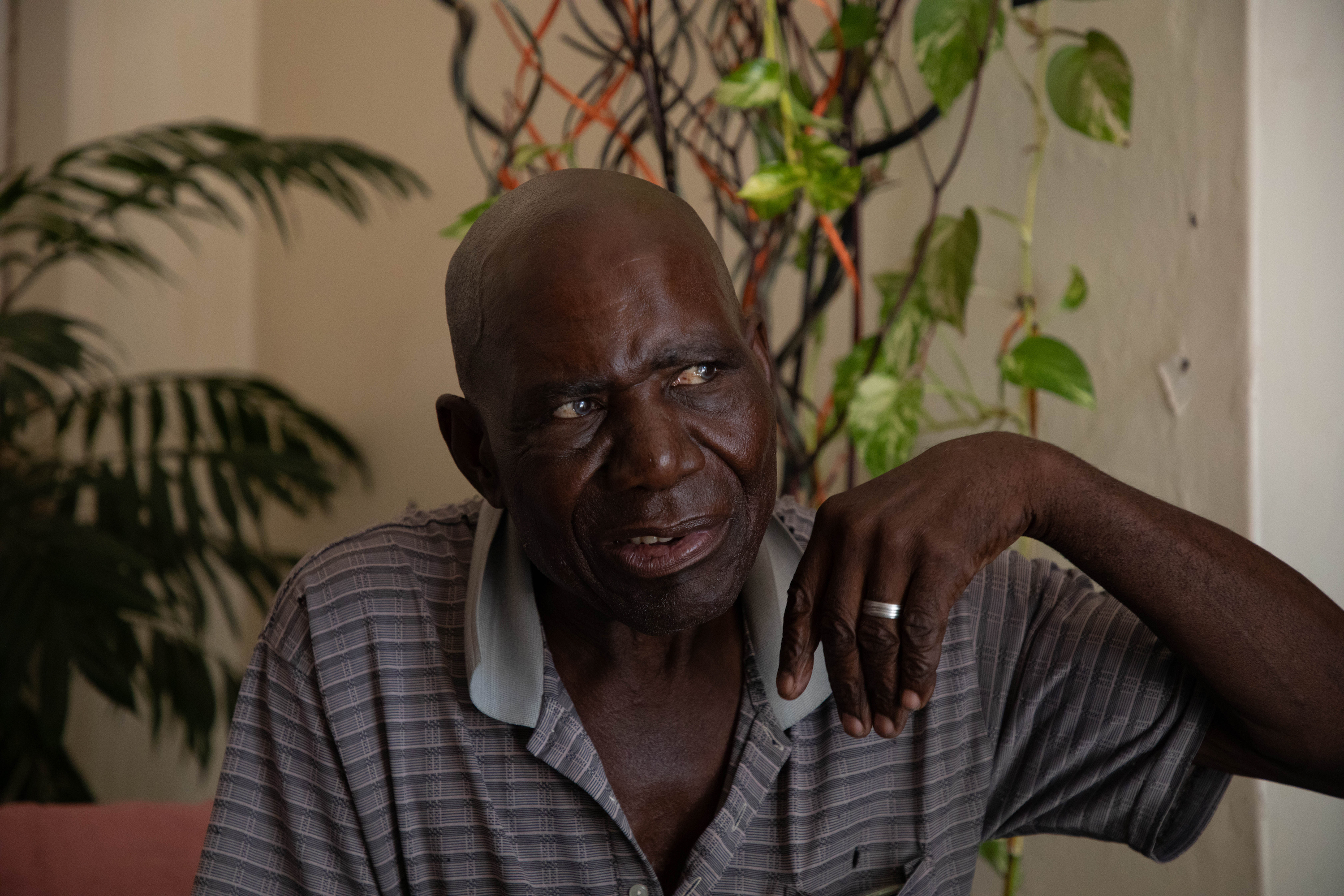
Vieira Monte (75), a Portuguese-speaking former soldier in the 32 Battalion, says he supports a white government. Monte fought on the side of the apartheid government in the South African Border War between 1966 and 1990. (Photo: Victoria O’Regan)
“Yes, I was with the 32 Battalion,” says Mario Hongolo, a genial septuagenarian sitting with his wife Rosa in their garden on the day we visit Pomfret.
Hongolo is Angolan. He arrived in Pomfret, alongside about 1,000 former soldiers and their family members, in 1989, and has lived here ever since. These were black men recruited by the apartheid government in around 1975 to fight with the then South African Defence Force against the communist regime in Angola and the Namibian liberation movement the South West Africa People’s Organisation (Swapo).
The 32 Battalion was what military analyst Helmoed Heitman calls an “elite force”.
Some of the Angolans recruited into it had first taken up arms against the Portuguese colonialists in the 1960s. As such, says Heitman, “Some of these soldiers had been at war pretty much their whole life. And they were really superb soldiers. Nothing fazed them.”
Because the Angolan fighters could speak Portuguese, they were a valuable asset to the apartheid military. Put through a rigorous orientation, these men were part of a unit which Heitman says was “recognised internationally as one of the best fighting battalions in the world”.
But when the war ended, the soldiers found themselves in a delicate position. Neither Namibia nor Angola wanted to take them because of their collaboration with the apartheid regime. That meant that they were effectively stranded in South Africa, where the government initially deployed them in townships as a controversial “peacekeeping” force which would go on to be accused of serious human rights violations.
In 1993, the unit was disbanded. The men were given South African citizenship and paltry payouts, and sent to live in the old army barracks of Pomfret.
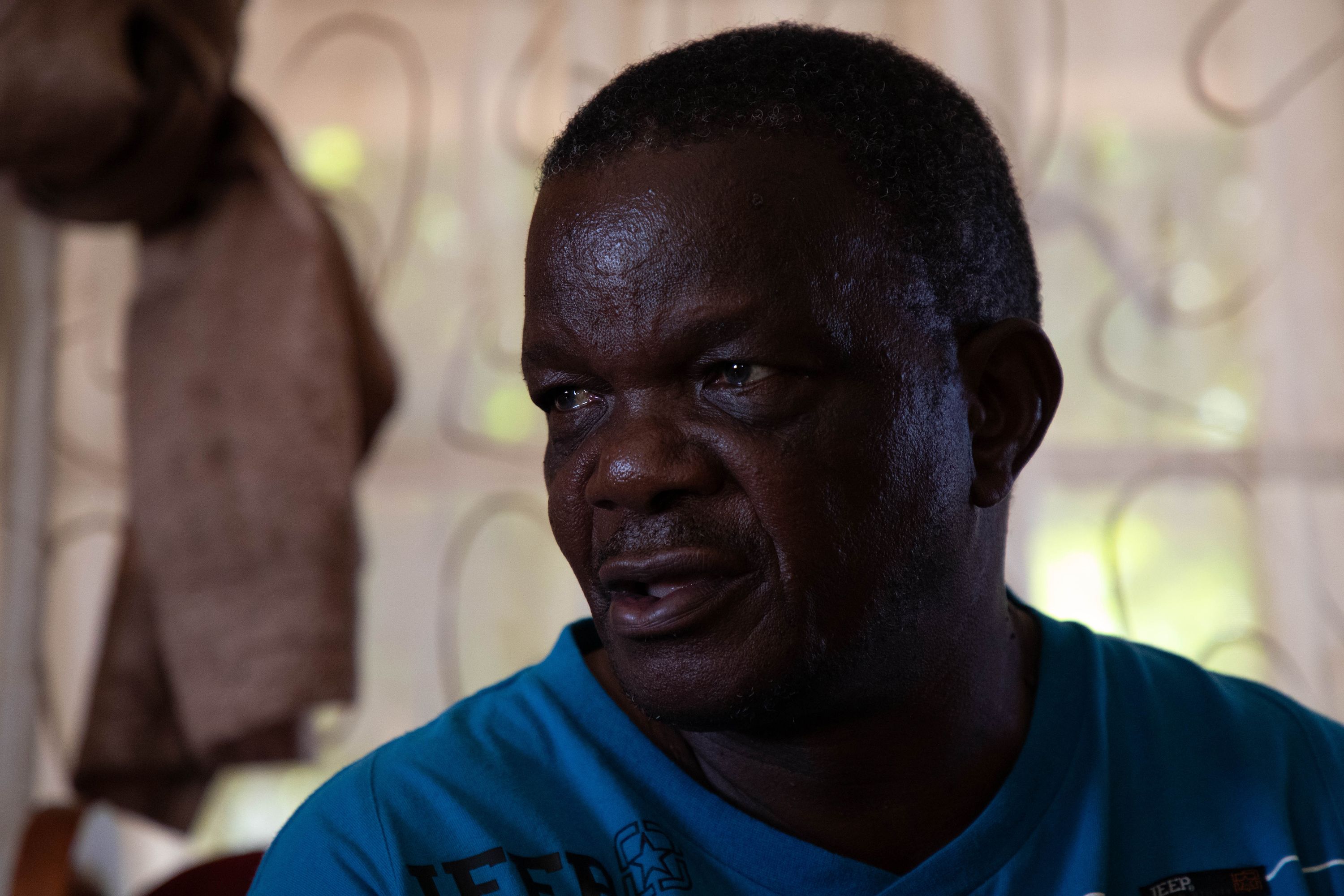
Mario Hongolo, a 32 Battalion veteran who moved to Pomfret at the end of the Border War, sits in the lounge of his home on 11 April 2024. After fighting in the South African Border War, Hongolo worked as a mercenary in conflicts abroad. (Photo: Victoria O’Regan)
“They got shafted,” says Heitman bluntly. “Dumped out there in the middle of nowhere without the means to do anything else.”
In Heitman’s view, the Angolan soldiers of the 32 Battalion are an uncomfortable subject for both the former apartheid regime and the democratic government.
“The white right doesn’t want to remember them because [in their opinion] black people can’t be competent soldiers. The ANC doesn’t want to remember them because it doesn’t want to remember that anyone [black] could work for the apartheid regime.”
In a more extreme version of the Pomfret story, the ANC is actively hostile to the 32 Battalion veterans. In 2007, a Mail & Guardian article quoted government officials saying that the people of Pomfret “opposed the liberation struggle”.
Periodically, the government has attempted to relocate the residents of Pomfret to other North West towns. The rationale behind this officially lies in the proximity of the old asbestos mine, which poses serious health risks to the people of Pomfret. But for the veterans themselves, these deeply resented relocation efforts are further evidence of the government’s antagonism towards them.
“Socially and historically, the origin of Pomfret village is intimately linked to South Africa’s brutal past and more specifically the activities of the former South African Defence Force (SADF) in Angola, the former South West Africa and South Africa’s own townships,” reads a judgment handed down in the Land Claims Court in March 2022.
“The history does matter,” adds the judgment, “because it partly explains the vulnerability of Pomfret’s residents”.

Pomfret is the site of an old asbestos mine, which was built in the 1960s. The abandoned mine can still be seen just beyond the outskirts of the town. Over the years, the government has frequently used the threat of asbestos pollution as a reason for trying to evict the town’s remaining residents. (Photo: Victoria O’Regan)
***
Today, Pomfret is a nothing town. There are virtually no jobs, except at the Pica Pau School — where harried head of department Prince Gauthusi told us 171 children are enrolled. Residents do not have reliable access to water or electricity. A community ally approached the courts in 2021 to try to compel the government to provide basic services, but nothing has come of it.
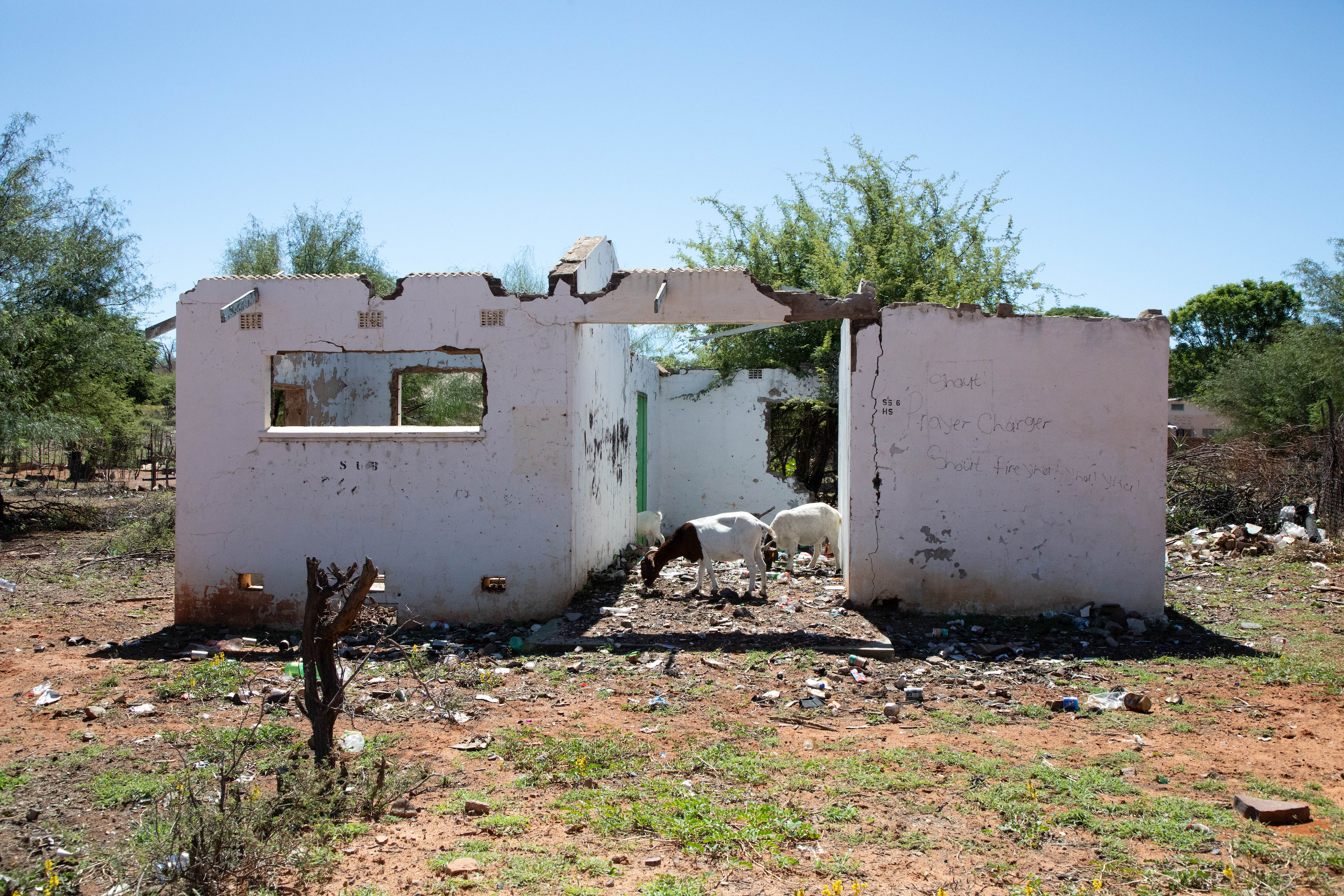
Goats roam a dilapidated military barrack on 11 April 2024 in the town of Pomfret, about 65km from the Botswana border in North West province. Pomfret was closed as a military base in 2000, and the town has rapidly deteriorated since. (Photo: Victoria O’Regan)
“We don’t even have one service,” says Anna Hongolo (29), a second-generation Angolan who spends her days looking after the village toddlers at a dilapidated crèche.
“The DA tries, they bring us potatoes. The government only comes here when there’s elections.”
Hongolo says if she could petition the government for anything, it would be electricity — a refrain we heard repeatedly in Pomfret. The town appears to have had some degree of electricity supply until 2015, when Eskom cut it off: further evidence, in the eyes of the locals, that they are being punished for the sins of apartheid.
Asked why she didn’t simply move out of Pomfret, Hongolo spread her hands wearily.
“Where will we start?” she asked. “Imagine my family of 13 to 15. Here, at least we have houses.”
Many of the homes in Pomfret are abandoned, giving the town a slightly ghostly feel. There are a handful of spaza shops, but no real industry.
“People are looking to work in security, but now they [have] become old,” said Mario Hongolo, the father of Anna.
“Security” is a euphemism. Pomfret has long been a subject of fascination for international journalists because of its reputation post-1994 as a recruiting hub for mercenaries. With their elite skills, the former fighters of the 32 Battalion were perfect guns for hire: available to prop up foreign regimes and, on occasion, assist with coups.
But those days are long gone for the likes of Hongolo and Monte, who are now elderly men. Most of the residents of Pomfret survive on paltry social grants.
“The ANC sometimes come to make a meeting here. They come, ask … you tell the problems, nothing happens,” Hongolo told us.
Like Monte, he expressed one particular political affiliation.
“Most Angolan people like the DA because we like the old [apartheid] government. Mr [FW] de Klerk was the president when we came in 1989.”
There is a possibly apocryphal story, though Heitman believes it to be true, that when the apartheid regime announced the disbanding of 32 Battalion, a veteran of the unit presented De Klerk with 30 pieces of silver. Like Judas, he had betrayed them.

The local – and operating – crèche where Anna Hongolo (29) works is in a state of disrepair. (Photo: Victoria O’Regan)
***
Just 47% of eligible residents of the Kagisano-Molopo Local Municipality voted in the 2019 general elections. The Electoral Commission of South Africa (IEC) did not respond to Daily Maverick’s questions about whether it had embarked on any campaigns in the area to improve this turnout come 29 May.
Anna Hongolo and her friends Magdalena Kanivete (37) and Theresa Ciata (36) shook their heads when asked if they would vote.
“Every time we vote, there’s nothing; no change,” Hongolo said.
In the area of Pomfret known as Esperanza, we stopped to talk to a 49-year-old South African woman married to an Angolan man. She declined to give her name.
“Voting? There’s no point. Even if we vote for another party, the ANC will still win,” she said.
Pomfret had received multiple political campaigners in recent weeks, she said, promising water, electricity, good things. She didn’t believe a word.
“Nothing changes. Nothing’s coming.” DM
Daily Maverick’s Election 2024 coverage is supported, in part, with funding from the Friedrich Naumann Foundation and vehicles supplied by Ford.


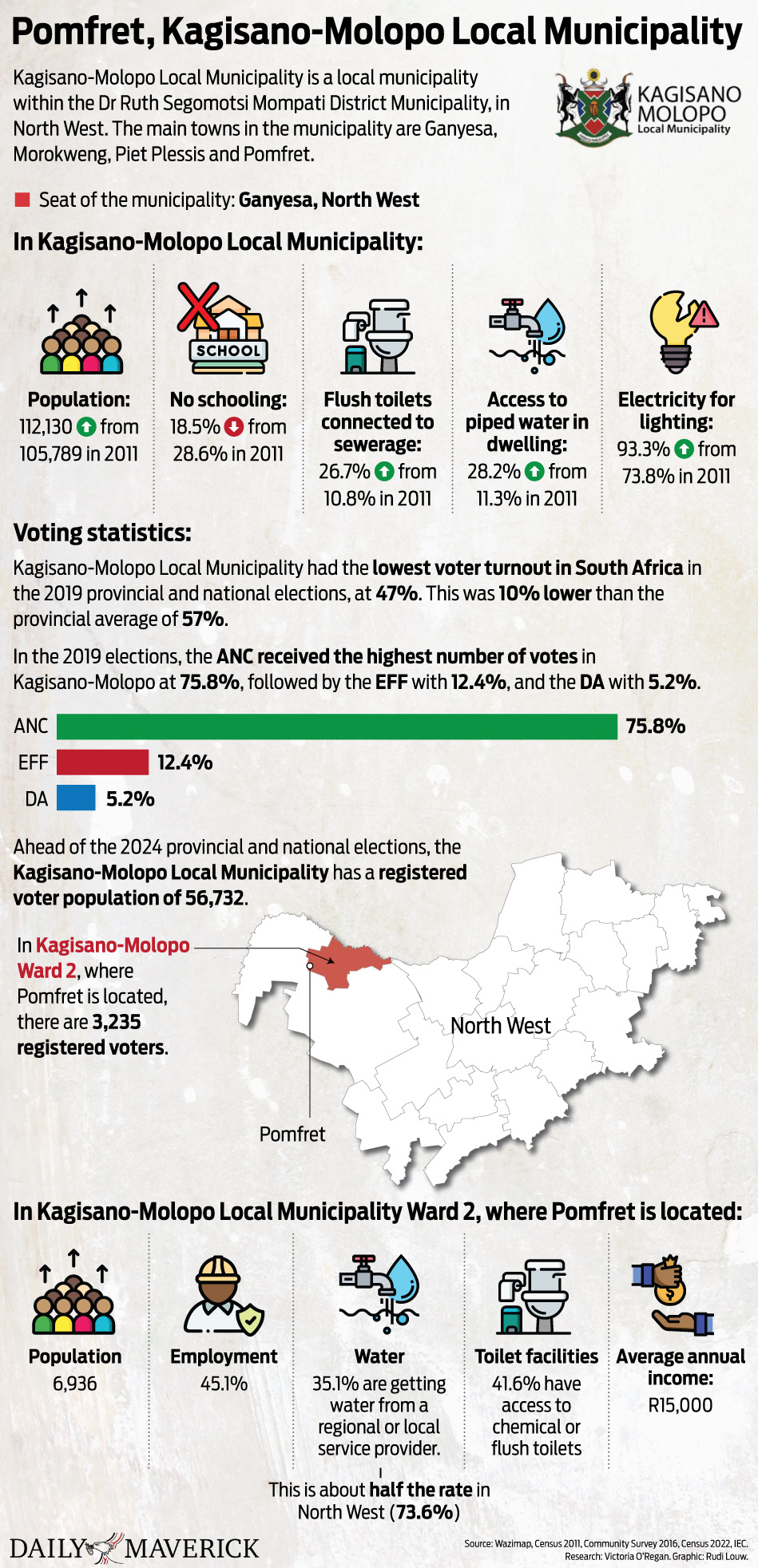
















Nothing there to steal or plunder so the ANC gives it the by-pass treatment.
“Most Angolan people like the DA because we like the old [apartheid] government. Mr [FW] de Klerk was the president when we came in 1989.”
Isn’t that the same government that used you and then dumped you here to fend for yourselves? And you like them?
Doesn’t that tell you everything you need to know about the ANC. In small, forgotten towns like this, the residents would rather have an apartheid regime government than an ANC run government. For shame!
So they vote DA because they like the apartheid government!?
Interesting isn’t…
They are actually saying that the DA will bring back apartheid, the system of governance they loved.
You assume that they are saying the DA will bring back apartheid. Remember ASSUME means making an ASS of U and ME. If the DA did try to bring back apartheid they would be voted out in the next election. So I feel sure we will never see it again . I think you will find Skinyela that these people like the DA because the only well-run province is run by the DA because the DA stands for meritocracy and is forward- planning. Ask yourself the question. If the DA are so terrible, why are people flocking to the Western Cape from the Eastern Cape?. Surely it means that things are worse there. What is sad however is that a vote not cast is effectively a vote by default for the ANC. Can we really afford anther 4 years of decline and degeneration?
Like Monte, he expressed one particular political affiliation.
“Most Angolan people like the DA because we like the old [apartheid] government. Mr [FW] de Klerk was the president when we came in 1989.”
I am quoting what was said by them.
I am not sure whether the assertion that most EC people go to Western Cape, what I know is that people from the Western side of the EC are mostly the ones who go to WC and those on the Western side mostly go to KZN.
But overall, the province that accounts for most of immigration is Gauteng.
A vote not cast is simply just that, a vote not cast. If ANC got ten of the actual votes cast that’s the number the ANC got, the votes not cast are never counted..
Even if you want to put it in percentage terms.
Lastly, take this as a warning, the idea that if we tell the disillusioned voters that if they don’t vote their votes will automatically be given to the ANC is actually you campaigning for the ANC, because here we’re talking about people who are disillusioned with the Party(ANC) they love but can’t see themselves voting some other party, so they rather not vote at all.
If voting were to be made compulsory and they are dragged screaming and kicking to the voting booth, they will mostly vote ANC… Grudgingly so.
It’s should be obvious that they speak from a position of ignorance because the DA has never governed South Africa
And only 5% voted for DA, whilst 76% voted ANC. It proves the point that voting is not a rational-cognitive exercise, but is largely emotionally driven.
The figure of 76% ANC is for the whole Kagisano-Molopo Municipality which covers a much larger area than just Pomfret. At the two voting stations in Pomfret the vote is about 60% DA.
That is exactly what the ANC has done to the majority of people that voted them into power. And they like them!!
I really appreciate this kind of coverage, thanks. So good to get away from the main centres.
A sad story all round.
But tell me: what happened to the collaborators in homeland governments?
They switched sides without a beat, some quickly rising to high positions in government.
That at least in part explains the horrendous corruption post-1994. EC for example swallowed Ciskei and Transkei whole. Is it surprising that it’s one of the most dysfunctional provinces?
This is very sad, but one one must ask what Charities/ Welfare Organizations are operating in the area to assist them- Irrespective of the political aspects we talking of people sitting in a hopeless situation needing help-
The problem is that we have Elites, that is political elites who lack visionary leadership. I am not pointing any single political party or leader, but the entire ruling class lacks something Maan. They lack vision, they lack the fuel that would take us to the next level. Since Elon Musk, not as a God, because there is only one God in Heaven and his name is Jehovah,the creator of the universe and the DNA that powered our emergence as biological entities who are product of cosmic evolution. In that our star system created the conditions for Earth to emerge as a safe haven for life. Look at our star system, and you will see that Earth is shielded by Uranus and Jupiter. These planets play a vital role in protecting our planet from super massive asteroids. But as the saying goes, the dinosaurs didn’t have a space program. Shout out to NASA for their asteroid detection system, hopefully they will develop a platform whereby they will be able to deflect asteroids in the near future. Coming back to our ruling elites, apart from Rupert due to the fact that Richemont has become a massive holding, shows that Ntate Rupert has some tricks up his sleeves. So please Ntate Rupert don’t forsake SA, you are the son of the soil, you are an African and you owe your being to the mountains and the zebras and the Buffalo. I don’t know whether I should accord citizenship to the hyena and the elephant. But I digress, all I am saying is that Tata Rupert is our leader as a country due to Richemont
Ntate, I’ll take 2️⃣ of what you’re having
Ditto. but double the dose, I need to escape reality.
What an insightful and telling story. Thank you for sharing this DM. Very tragic however.
What an insightful and telling story. Thank you for sharing this DM. Very tragic however.
A well researched and well written article.
I served there as a medic for brief spell 1989.
It was disheartening to see these families being discarded by both sides.
Promises were made, but nothing came of it.
Many of these soldiers were angry and confused – and some were quite violent.
Its another example of the sad consequences of an evil regime.
And the current rulers have not covered themselves in glory either.